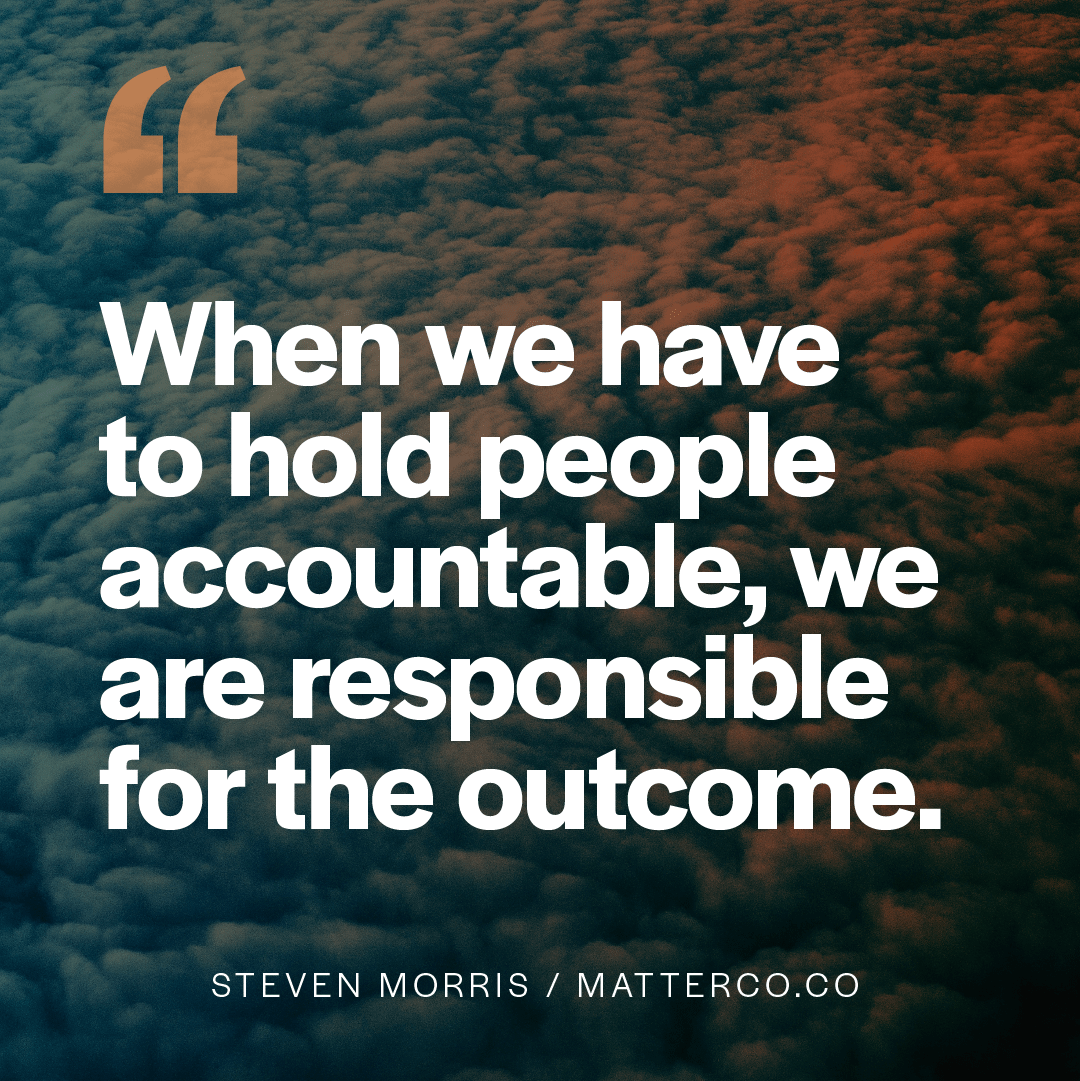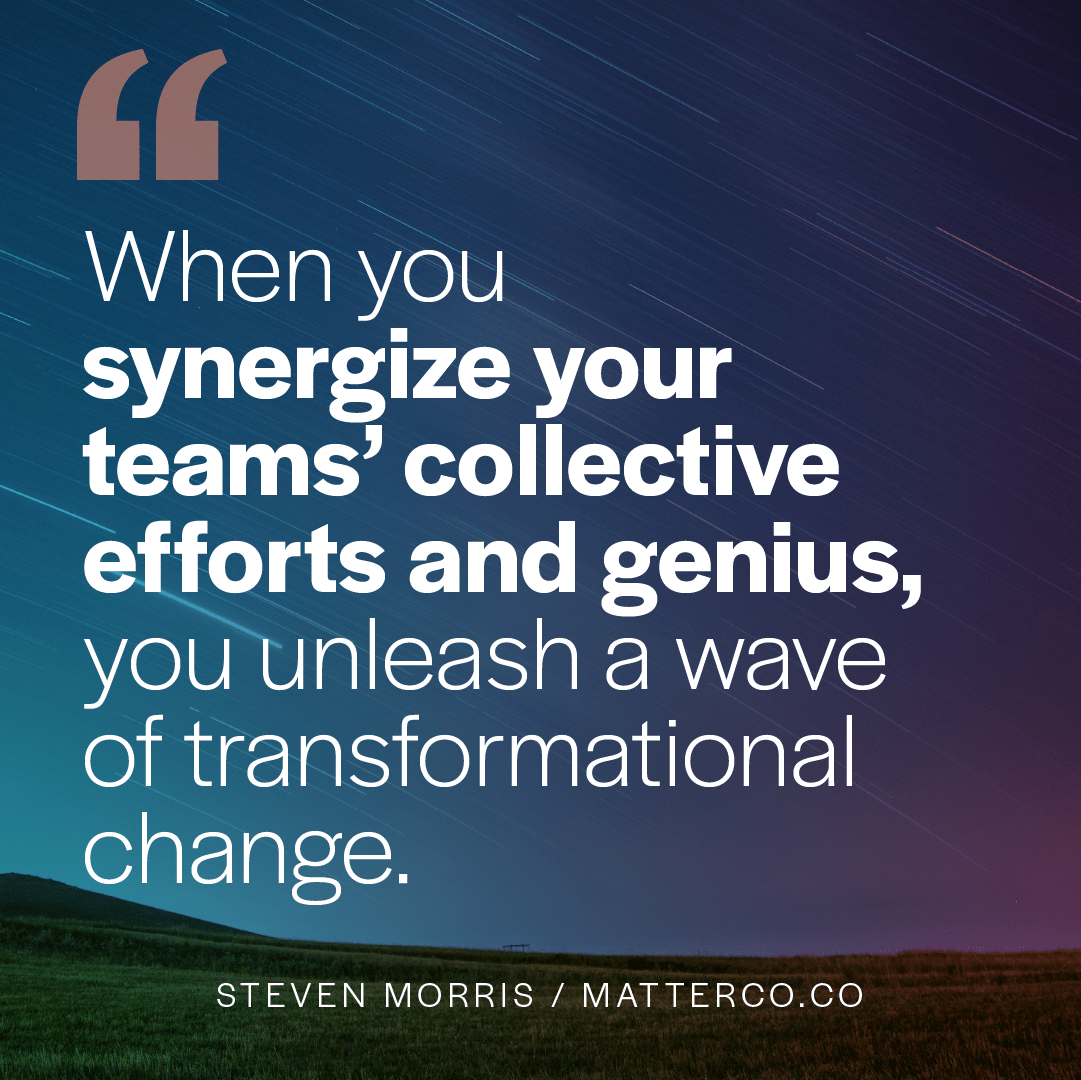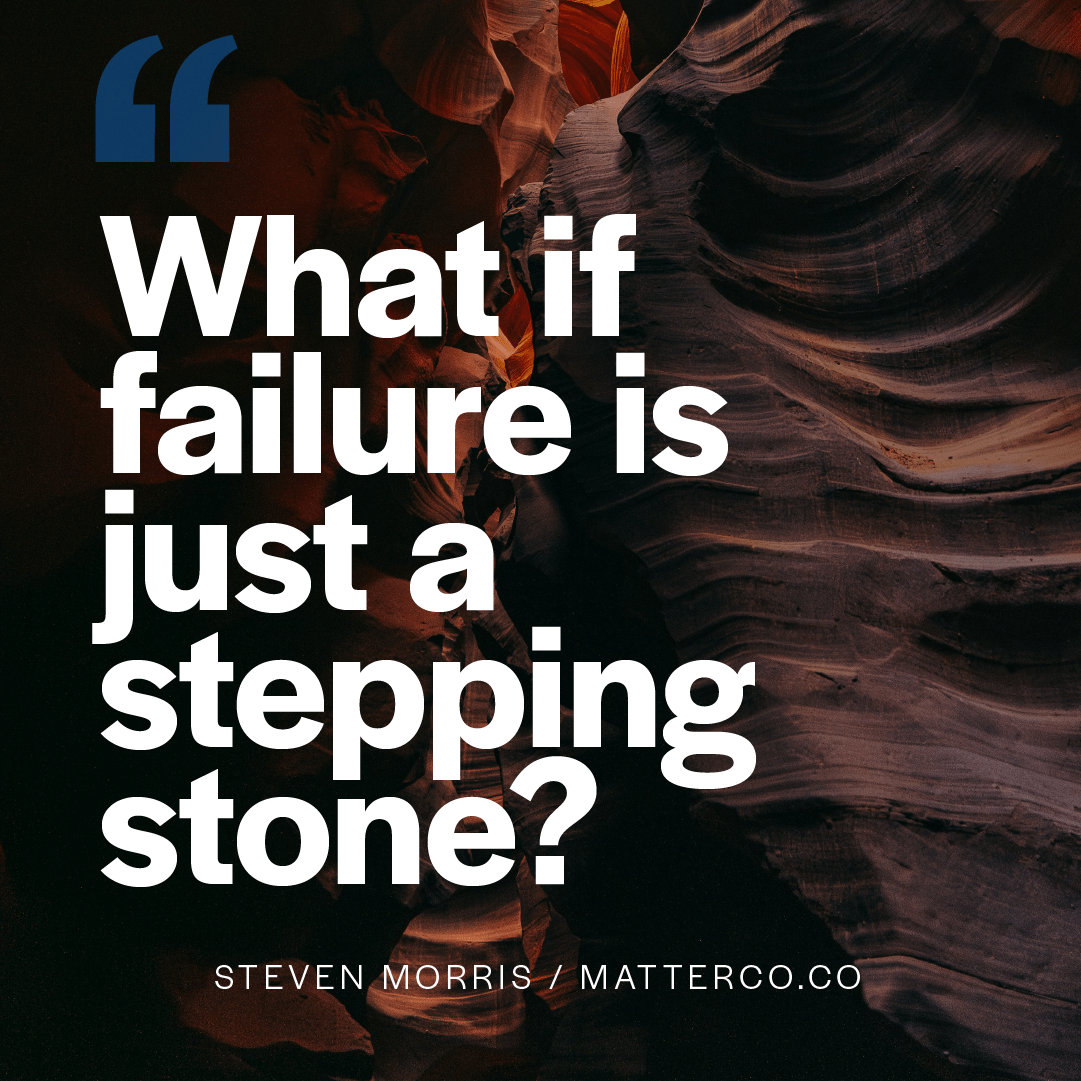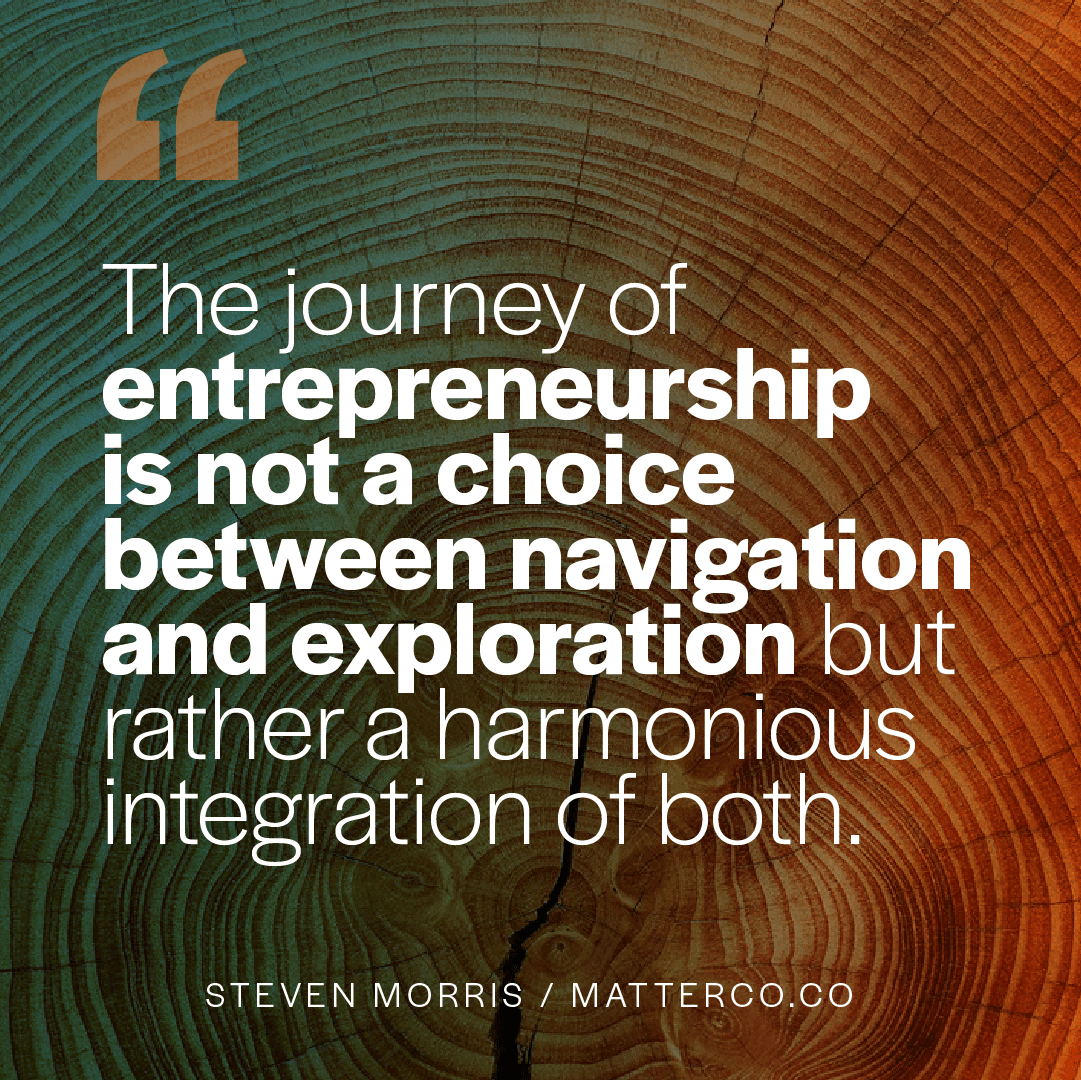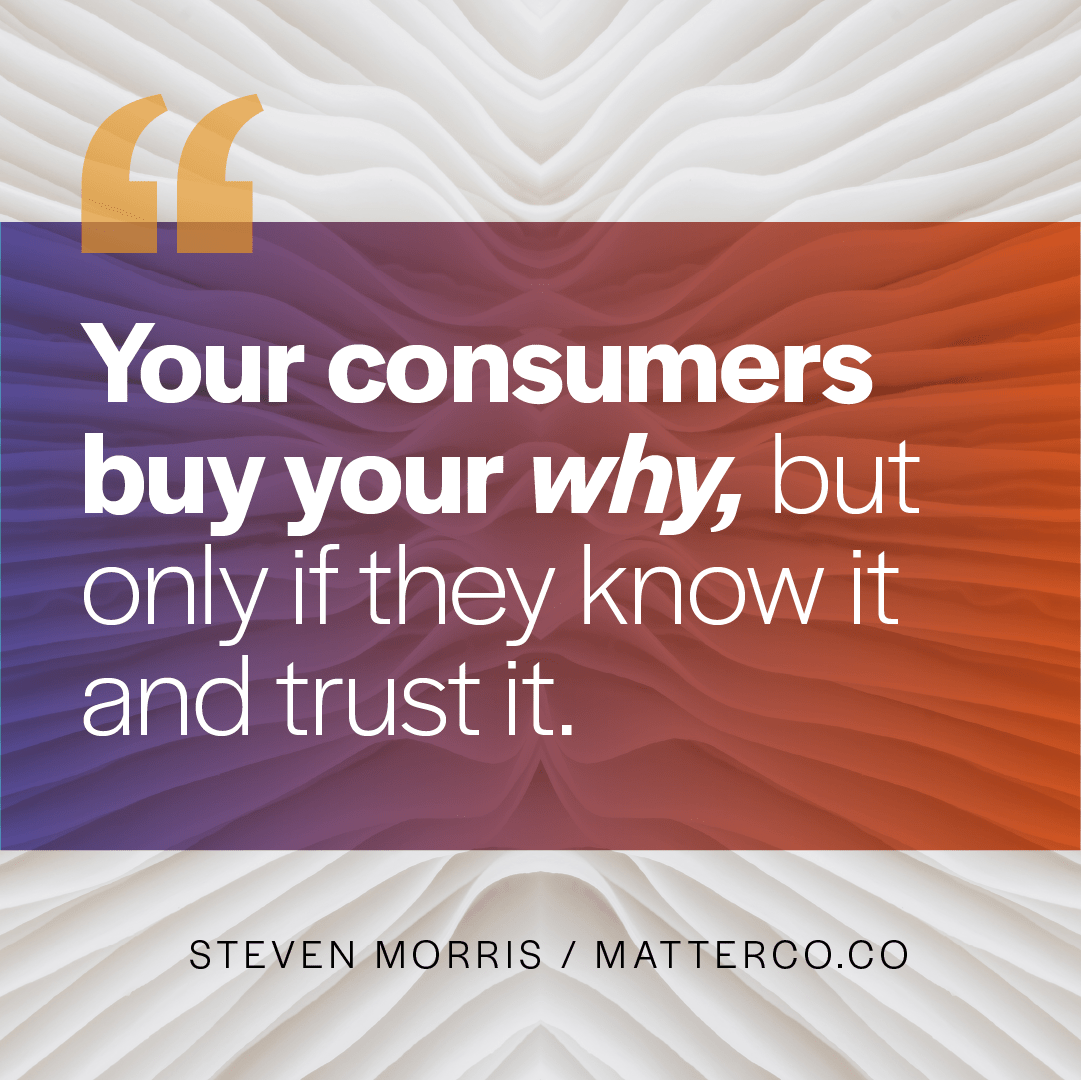
Making Brand Purpose Matter
When organizations are considering a brand evolution, the most common question asked is “how can our newly defined brand purpose be activated in our business?“
What leaders are typically asking in this question is “what role does our brand purpose play in the business, the culture, the marketing?”
Boiling this question down, what they’re really asking is “what’s the value and benefit of an evolved brand built on purpose?”
Here’s an executive summary to answer these questions.
What is a Brand Purpose?
A brand purpose isn’t an ornamental marketing term reserved for large corporations like Apple, Nike, Amazon, and Google. Nor is it a navel-gazing practice for new-age businesses.
Brand purpose applies to all businesses: small businesses, solopreneurs, Fortune 100’s, and start-ups. It also applies equally to for-profit and non-profit companies. And, it may begin to solve what keeps leaders up at night.
Properly defined and activated, your brand purpose will be the reason your customers buy from you. It’s the reason your business exists beyond profit. It’s what encourages your team to go above and beyond to serve and create something of exceptional value for your customers. Your brand purpose aligns and ignites your team and leadership focus on what matters most to your business.
Consumer consciousness is changing the way people buy and how the market works. More and more consumers see brand purpose as an important factor when deciding to purchase a product or service. In fact, The 2018 Earned Brand Study by Edelman “reveals that nearly two-thirds (64 percent) of consumers around the world now buy on belief, a remarkable increase of 13 points since 2017. These Belief-Driven Buyers will choose, switch, avoid, or boycott a brand based on where it stands on the political or social issues they care about.”
This means two important things.
First, that a powerful brand purpose can set a company apart from the competition and comparable brands.
Second, that belief-driven consumer mindsets have gone mainstream. Again, according to Edelman, “Belief-Driven Buyers are now the majority in every market surveyed, across all age groups and all income levels.”
But how can brands apply their own in today’s market?
Why Your Why Matters
In his now-famous TEDx talk, Simon Sinek popularized a concept that goes back to the Greeks (eudaimonia, meaning “good” “spirit”) on the importance of Why. Here’s the simple and potent premise: You need to know why you’re in business and share that with the world. Your customers buy into this motivation. Your brand purpose is your reason for being, and customers buy your why not your what.
In other words, no one really cares about your “Authentic pastries, sourced from the freshest organic ingredients” (The what and the how). Your customers can buy all those ingredients at the local farmers’ market or in the less-expensive product that sits next to yours on the shelf. What they do care about is how your why delivers on the real value of your products.
Ultimately, your why is what’s in it for them.
By formalizing and harnessing the passion of the business founders, owners, and leaders, it brings the brand purpose out of leaders’ head and heart and makes it actionable and clear to the team. Once it’s clear to the team, and when brought to life, it can be more easily understood and felt by the customer.
What started as a passion, therefore, becomes a set of decision-making principles that effect brand culture and customer experience.
Reasons Brand Purpose Matters:
- It positively impacts the world of your customers. Brands with a purpose can have a profound impact on their communities as well as their customers. These brands set the stage for change and have the opportunity to recruit people around them to be a part of the solution.
- It builds trust and loyalty. When it comes to brand purpose, authenticity rules. People can smell a fake from a mile away, so it’s in your best interest to only establish your brand purpose from the soul of your company. By being consistently real with your customers, you build trust, and trust leads to loyalty.
- It sets your brand apart. A publicly activated Brand Purpose will differentiate your brand from the competition. When customers know what you stand for, they can align their own values with yours. This is how people choose to belong to your brand, and how deep and lasting relationships are created.
- It drives your culture. A clear and activated purpose rallies your team around a motivating center. Your brand purpose activates the should of your business and aligns the entire team’s actions and behaviors. Well defined and activated, your brand purpose provides clarification required to create a strong corporate culture.
- It defines your customer experience. As your employees rally around and live your Brand Purpose, they embody it through how they treat, serve, and communicate with your customers. This is what creates your customers’ experience of your brand. When you deliver on your Brand Purpose and Promise, customers trust you.
Remember, your consumers buy your why, but only if they know it and trust it.
Here are three examples of brands who activate their purpose—
Patagonia:
According to Accenture, 62% of consumers want companies to stand up for the issues they are passionate about and 66% of consumers think transparency is one of a brand’s most attractive qualities.
As social and buyer consciousness has elevated, consumers started caring just as much about the impact of brands, as they do about their actual product. More brands are more frequently touting benefits like sustainability, transparency, diversity, inclusion, and fair wages. What was once the “4-Ps Of Marketing” (Product, Price, Place, and Promotion), seems now to have emerged into the 5th P: purpose.
Patagonia is a shining example of what it means to be purpose-driven. From their early foundation, they have been environmentally conscious, and the company keeps leaning further into environmental activism as a vital attribute of who they are.
Patagonia Brand Belief Platform:
Not long ago, they changed their mission from a product/purpose hybrid of “Build the best product, cause no unnecessary harm, use business to inspire and implement solutions to the environmental crisis” to the purpose-driven mission “Patagonia is in business to save our home planet.”
Build the best product
Our criteria for the best product rests on function, repairability, and, foremost, durability. Among the most direct ways we can limit ecological impacts is with goods that last for generations or can be recycled so the materials in them remain in use. Making the best product matters for saving the planet.
Cause no unnecessary harm
We know that our business activity—from lighting stores to dyeing shirts—is part of the problem. We work steadily to change our business practices and share what we’ve learned. But we recognize that this is not enough. We seek not only to do less harm, but more good.
Use business to protect nature
The challenges we face as a society require leadership. Once we identify a problem, we act. We embrace risk and act to protect and restore the stability, integrity and beauty of the web of life.
Not bound by convention
Our success—and much of the fun—lies in developing new ways to do things.
Southwest Airlines:
Southwest Airlines is famous for its integrated brand-culture fusion and how they differentiate itself in the airline market. They have a model for exceptional brand loyalty due to their ability to stay true to their core values across all levels of their culture.
Part of their famous brand is expressed in their public trading handle (how they are listed on the NY stock exchange): LUV. Their proven ability to consistently deliver on their brand promises has been studied by brand experts and has been taught in classrooms as a world-class brand example. This consistent approach to their brand beliefs shows up in their advertising, their employee recruiting and training, and shines in their customer service.
Here’s their brand belief platform.
Purpose: Connect People to what’s important in their lives through friendly, reliable, and low-cost air travel.
Vision: To be the world’s most loved, most efficient, and most profitable airline.
Our Company Promise
Southwest will provide a stable work environment with equal opportunity for learning and personal growth. Employees will be provided the same concern, respect, and caring attitude within the organization that they are expected to share externally with every Southwest Customer.
Our Employee Promise
I will demonstrate my Warrior Spirit by striving to be my best and never giving up. I will show my Servant’s Heart by delivering Legendary Customer Service and treating others with respect. I will express my Fun-LUVing Attitude by not taking myself too seriously and embracing my Southwest Family.
Learn more about Southwest Airlines brand beliefs here.
Dove:
Dove has been lauded for its inclusion and diversity across their brand. A Wall Street Journal article highlight the Dove brand purpose states, “Dove has long been known for its commitment to representing diversity in its ads. In 2004, the Unilever brand made its mark with the “Real Beauty” campaign, featuring untouched photographs of real women—not models—chosen to reflect the diversity of the population at large.”
Their #speakbeautiful movement aims to encourage women to be kinder to themselves and embrace (even celebrate) their natural bodies and beauty. By humanizing their audience they humanize their brand, and in turn, become more relatable. In contrast to many of the highly edited images found in much of beauty advertising, Dove works to impact the world for the better by taking the natural-beauty route.
Here are the Dove brand beliefs:
At Dove, we have a vision of a world where beauty is a source of confidence, not anxiety. Our mission is to ensure the next generation grow up enjoying a positive relationship with the way they look – helping girls to raise their self-esteem and realise their full potential.
Purpose: Discovering the value of ‘real’ beauty and improving self-esteem worldwide.
Videos tied to Dove’s purpose garnered over 35 million views on YouTube within 2 weeks and generated viral unpaid exposure worth over $150 million.
If you want a more trusting team, a culture of belonging or a magnetic brand that attracts more of the right customers, I can help. If you'd like to explore if working together makes sense, drop me a line.




